The Best Freight Broker Software
We’ve reviewed the top systems on the market for several different industries, including intermodal freight brokers, 3PLs, and hybrid operations. Find the best fit for your company to help streamline carrier management and automate load matching.
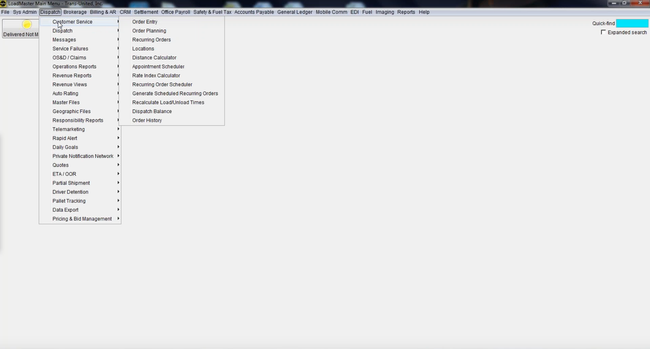
- Offers advanced, real-time GPS tracking
- Includes billing documentation
- Extensive asset and employee database management
- Responsive customer service
- Supports dispatch, billing, safety management
- Supports both carriers and brokerers in one system
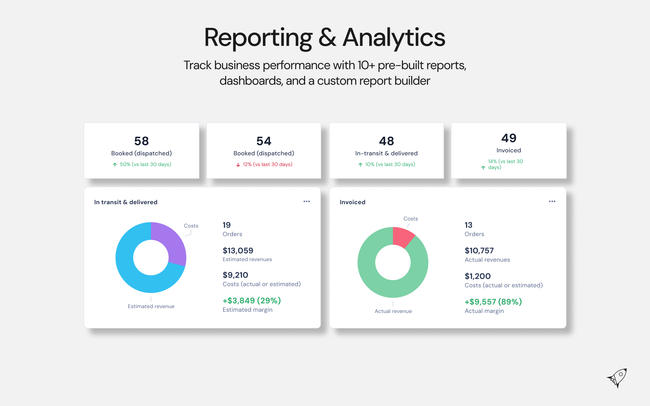
- Free trial available
- Integrates with over 20 software systems
- Has customer and partner portals where customers can request rates, book orders, and view invoices
Here’s a rundown of the top freight broker software based on core features, cost, and integration options.
- McLeod LoadMaster: Best Shipment Tracking
- Alvys: Best for Hybrid Operations
- Rose Rocket: Strong Integrations
- Tai TMS: Best for LTL Freight
- AscendTMS: Best for QuickBooks Users
- FreightPath: Best Load Booking
- Tailwind: Most User-Friendly
- Descartes Aljex: Best for Intermodal Freight Brokers
- DAT Broker TMS: Best for 3PLs
- LoadPilot: Good for Smaller Brokerages
McLeod LoadMaster - Best Shipment Tracking
McLeod LoadMaster’s shipment tracking feature provides live location updates of your freight using GPS integration from carriers or telematics devices. The software will send you notifications if there are any shipment delays, disruptions, or ETA changes.
After connecting the carrier system devices to retrieve live data, McLeod will consolidate your tracking information into a centralized dashboard, offering you a comprehensive view of all active shipments. The system provides real-time updates during transit, allowing you to see the ETA for each shipment, any deviations, and potential risks.
If a shipment is delayed, you can contact your carrier to reroute the truck. Your client can access the customer portal to see shipment progress and updated ETAs without constant back and forth. The software also enables you to track data post-delivery to analyze performance, improving future route planning and enhancing customer service.
However, while McLeod offers strong shipment tracking capabilities, it is somewhat outdated and could be more user-friendly. The dashboard is a bit cluttered and lacks intuitive graphics.
Alvys - Best for Hybrid Operations
Alvys offers a comprehensive asset management module for hybrid companies that perform brokerage and carrier operations. It streamlines company-owned fleet management by tracking driver hours and integrating with telematic devices to monitor real-time data. For brokers, it helps you quickly onboard external carriers by integrating with carrier verification tools like SaferWatch. This gives you the flexibility to manage all assets within both operations on one system.
Additionally, hybrid companies can store all maintenance and safety records in one place. By storing all asset documentation and transaction history, your business can be ready for Department of Transportation (DOT) audits. For carriers, compliance with Federal Motor Carrier Safety Administration (FMCSA) regulations is crucial for preventing fines and retaining operating authority. Alvys ensures all documents are organized in one place to ensure your company’s compliance.
Alvys’s asset management module is connected to its dashboard, allowing hybrid companies to monitor important KPIs for both businesses. The dashboard consolidates financial data from all divisions, letting you view overall revenues and expenses for the period. Other metrics include load statuses, billing, and hours of service, giving you an overview of all operations without having to switch between two separate systems.
Alvys is an all-in-one suite starting at $183/month, with the price increasing with additional trucks, loads, and employees. This makes it a scalable solution for growing small to midsize hybrid companies.
Rose Rocket - Strong Integrations
Rose Rocket is our top pick for freight brokerage functionalities. It’s user-friendly, scalable, and designed to enhance transportation operations, like load optimization, route planning, and carrier management. Its strong API capabilities mean Rose Rocket integrates easily with other tools and platforms, making it a versatile choice for companies with existing tech ecosystems. It connects with popular accounting tools like QuickBooks. Additional integrations include Truckstop, Microsoft Dynamics 365, and DAT.
Rose Rocket features real-time freight tracking, displaying up-to-the-minute location details and status updates. It also provides tools for managing carriers, including their rates, performance metrics, and available capacities. The platform has mobile applications that allow drivers and other staff members to stay connected and updated, even when they’re on the move. The platform helps freight brokers streamline their operations, improve communication, enhance customer satisfaction, and make data-driven decisions.
Tai TMS - Best for LTL Freight
Tai TMS offers a comprehensive LTL rate management engine that helps boost your bottom line. You can see your negotiated rates and adjust margins for each customer, ensuring you optimize every pricing decision. Define rules by client, lane, weight, freight class, or mode, and easily store customer-specific tariffs to minimize errors during manual quoting. It’s a huge upgrade from spreadsheets or digging through emails trying to find individual rate rules.
Additionally, the system has a real time API carrier rate integration, so you can connect to all your LTLs, like FedEx or XPO. The API instantly retrieves rates, service levels, and transit times, making you more efficient in managing several carriers at once. Combined with the rate management engine, it makes for instant rate shopping and better service automation.
Tai TMS is best for LTL or full truckload brokers doing more than 200 monthly shipments to the US. Pricing starts at $945/month for the Growth plan, which includes two staff logins and 500 carrier profiles. The most popular Premium+ plan is $4,350/month, which may price out smaller companies.
AscendTMS - Best for QuickBooks Users
AscendTMS’s accounting module encompasses everything you do after a load delivers, like invoicing, recording carrier settlements, tracking A/R and A/P, and reconciling payments. Anytime you make a change in the system, QuickBooks Online updates automatically without requiring sync files or double entry.
The moment a broker hits “send to accounting” from Load Management, they can batch-invoice customers and see which loads are fully paid or fully settled. From there, they can push invoices, bills, or payments directly into QuickBooks with one click; the correct client, vendor, and pay-item mappings are already in place, saving you from dealing with mismatched accounts or inaccurate data.
This freight broker TMS software handles everything from archiving to factoring requests, while QuickBooks automatically captures the financials. Pricing starts at $49/user/month with no limit on the number of users you can add.
FreightPath - Best Load Booking
FreightPath’s load booking allows you to book loads in under two minutes, significantly reducing time spent on administrative tasks. This can be highly beneficial when you receive an urgent request from a client and need to book a load quickly.
For example, you must move a shipment of perishable goods from Miami to New York. Using FreightPath, you can enter the load details, including pickup and delivery locations, cargo type, and weight. Once you fill in this information, you can post the load into the carrier portal, which is instantly viable for vetted carriers.
Within a few minutes, the portal will send you multiple offers. You can select the best offer with a good rate and carrier reliability. FreightPath will automatically generate a rate confirmation, which the carrier digitally signs through the portal.
The system will create a bill of lading and other necessary documents, which you can share with the carrier and shipper. As the shipment progresses, you can track its status in real time through FreightPath’s activity feed. Upon delivery, the software will generate an invoice for you to send directly to the client.
FreightPath’s pricing ranges from $300/month for its startup plan to over $1,500/month for its enterprise package.
Tailwind - Most User-Friendly
Tailwind is user-friendly due to its intuitive design and straightforward interface. Even those new to freight brokerage find Tailwind’s dashboard easy to navigate, with clear labels and organized modules that enhance the user experience. The platform provides access to vital functionalities like order management, dispatching, and invoicing.
Online resources, tutorials, and dedicated customer support ensure that users can quickly familiarize themselves with the platform and make the most of its features. This emphasis on accessibility and support, combined with a design built for ease of use, cements Tailwind’s position as one of the more user-friendly freight broker software options available.
Descartes Aljex - Best for Intermodal Freight Brokers
Descartes Aljex is a suitable solution for freight brokers in intermodal transportation. It bridges the gap between various modes, including full truckload, LTL, rail, ocean, air, and parcel. Aljex provides real-time visibility into shipments and coordinates between different carriers and transportation modes. It also has automated order entry, lane pricing, capacity sourcing, and EDI messaging. Its ability to integrate seamlessly with rail providers and other intermodal stakeholders sets it apart for intermodal users. It connects with over 40 providers for greater flexibility, including Microsoft Dynamics GP, NetSuite, Sage, Truckstop, and more. Finally, Aljex features versatile pricing tools tailored to the dynamic nature of intermodal transport. This allows brokers to adjust to rate changes in different transportation modes quickly, ensuring competitive pricing and margin management.
DAT Broker TMS - Best for 3PLs
DAT Broker TMS offers extensive load board integration that is well-suited for 3PLs. It grants them access to a vast network of carriers and loads. It also provides real-time and historical freight rates, allowing 3PLs to benchmark their rates against the market. DAT offers features that enable quick vetting of carriers, checking their safety scores, insurance details, and performance history. In addition, the platform’s advanced analytics and reporting tools offer insights that can guide strategic planning and day-to-day decision-making. Overall, DAT’s integrated suite of tools meets the unique challenges and demands of 3PLs, making it one of our top picks.
LoadPilot - Good for Smaller Brokerages
LoadPilot features an intuitive interface and a low barrier to entry. This ease of use is crucial for smaller brokerages with limited staff and training resources to get operations up and running. It also offers pricing models for limited budgets, a significant consideration for brokerages trying to minimize overhead costs. LoadPilot’s integrated financial management features include invoicing, settlements, and financial tracking, minimizing the need for external accounting software.
What is Freight Broker Software?
Freight broker software is a type of transportation management software (TMS) that streamlines freight brokerage operations by entering loads, sourcing and qualifying carriers, dispatching drivers, invoicing customers, and paying carriers. Also known as freight management software, these solutions can be customized to handle the real-time needs of the freight brokerage, such as trucking dispatch, tracking fuel tax, billing payroll to the drivers, monitoring driver logs, planning routes via GPS mapping, and conducting routine maintenance on vehicles.
Similar to freight forwarding software, these solutions will provide the technological advantage that assists shippers with freight ready to haul by finding carriers qualified to haul the load. These software options handle operations (logistics), financials (accounting), and customer service in managing a transportation and shipping business.
Depending on the size of your operation, different types of freight broker software exist. One major question to ask yourself is: Do you provide storage for your customers? A small third-party logistics operation may just facilitate shipments between a manufacturer and a customer. Meanwhile, a large-scale supply chain management operation may require the oversight of procurement, inventory management, vendor communication, and dealing with government regulations.
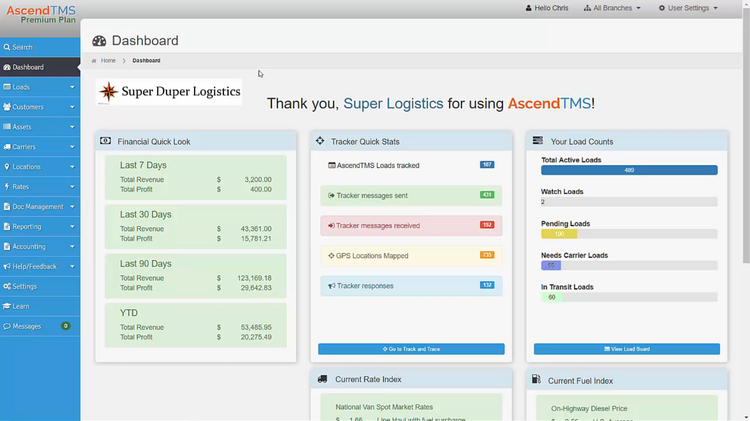
Core Capabilities
- Load Management: View, organize, track, and update your load tracking throughout the cycle. It displays information such as customer loads, load statuses, drop date, drop time, carrier, driver, and equipment being shipped. It allows you to sort loads by keywords, customer, driver/carrier, reference number, city/state, and more.
- Invoicing: Manage your shipping, land, and air freight by creating documents detailing what is owed to your shipping partners and others, such as agents, customs, and more.
- Quotations: Generate and send quotations for any of your modes of transportation. Track the status of quotes and convert them into orders whenever necessary. Include ad-hoc quotes, one-click shipment generation, email templates, shipping rate generation, and more.
- Routing, Dispatching, and Planning: Find shippers fuel and time-efficient routes by analyzing maps, traffic information, speed limits, modal limits, and the cost of fuel. With this data, shippers can determine the best carrier for each delivery and help consolidate shipments into the most efficient loads possible.
- Document Management: Digitally receive, maintain, and archive files, documents, and data. Customize templates and generate new documents. Put metatags on documents for easy indexing, search, and retrieval. Add security and access features for certain documents, individuals, and teams. Share documents internally and externally.
- Electronic Data Interchange (EDI): Facilitates the exchange of business documents from one computer to another in a standard electronic format between trading partners.
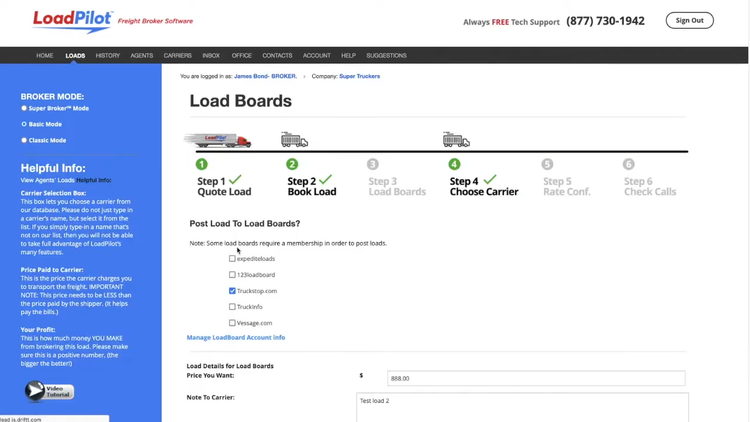
Primary Benefits
A freight broker aims to save time, money, and resources for their clients. The core benefits include:
Find the Right Carrier
Different types of goods are shipped differently. Many businesses rely on a freight broker to determine the best shipping methods for the goods they provide their customers. Freight broker software will look at all carrier rates available and help determine the most cost-effective way of shipping the goods. Many freight brokers may have existing relationships with shipping contacts and can lock in lower rates.
Compare Proposals from Prospective Carriers
A freight broker business will want to conduct audits on the carriers they frequently use routinely. This could be an evaluation of their pricing or an evaluation of their shipping times. This level of review can take time if conducted manually. Freight broker software will let you compare your current carrier data with carrier proposals you have received or recently discovered. Comparing prices, shipping speeds, and consignment rates can ensure you routinely have the best carrier possible.
Integration With Load and Truck Posting Websites
Most freight brokers will use popular load boards such as Getloaded or TruckStop.com. A load board (sometimes referred to as a freight board) is an online marketplace where truck owner-operators, shippers, and freight brokers can post and search for loads to keep freight moving.
When using freight broker software, you’ll be able to post on various load boards across the internet. This will let you notify these truck owner-operators and shippers of the work your company offers. Integrating with these boards will allow you to update your listings across multiple websites with a click of a button.
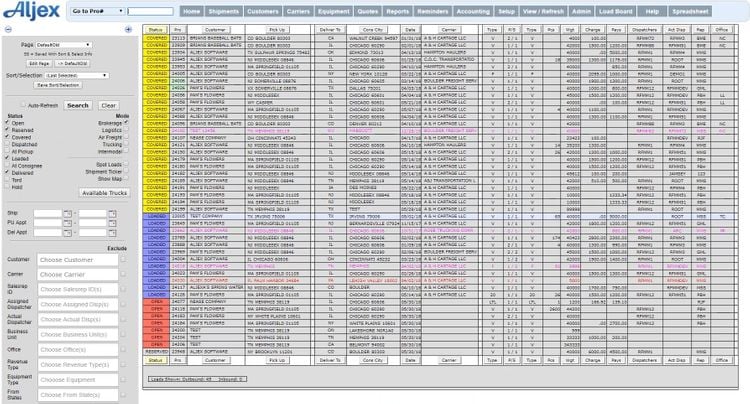
Pricing Guide
Various factors impact freight broker software pricing. These include the number of shipments handled, the total number of users requiring access, and the inclusion of support or hosting services. Here’s a breakdown of what you can expect to pay based on your company size:
Entry-Level
- Company Size: 1–10 users
- Average Yearly Cost: $3,000–$12,000 per year
- Product Examples: FreightPrint Basic, AscendTMS, Tailwind Standard, DAT One for Carriers/Brokers (Basic), Alvys Standard, Rose Rocket
Mid-Tier
- Company Size: 10–50 users
- Average Yearly Cost: $15,000–$50,000 per year
- Product Examples: Tailwind Pro, AscendTMS Pro, Aljex Core, Rose Rocket Growth, Alvys Advanced, DAT One Pro
High-Tier
- Company Size: 50–200 users
- Average Yearly Cost: $50,000–$200,000 per year
- Examples: Rose Rocket Advanced, Aljex Enterprise, McLeod PowerBroker Standard
Enterprise Tier
- Company Size: 200+ users/multi-region or global operations
- Average Yearly Cost: $200,000–$1M+ per year
- Examples: McLeod PowerBroker Enterprise, CargoWise One for Brokers, SAP TM for 3PLs, Alvys Enterprise, DAT iQ for Enterprise
How to Choose
A freight broker is a crucial link between shippers and carriers. They come into play anytime a business requires outsourcing its overall logistics process. Freight software programs such as TMS systems and ERP software can cover the needs of a freight brokerage, but there are many reasons a business may look for something industry-specific.
Single Freight Brokers
Freight brokers can easily run their own businesses if they can arrange transportation and track the load hauled by a freight carrier. These carriers can be as simple as parcels delivered in the mail (via UPS or FedEx) or large-scale transportation via sea or air. Freight brokers starting out may desire a simple tool that lets them match trucks with loads. Truckers and carriers can see loads along their routes with freight broker software technology advancements.
Once you begin to win broker contracts, you’ll be dealing with several contracts, bill of ladings, and accounting work to handle. This will all happen while reviewing carrier qualifications and ensuring you’ll have the best relationship moving forward. This may sound overwhelming to a sole proprietorship, but the automation offered in freight broker software will help you find shippers, find carriers, set prices, and move freight.
Mid-Sized Freight Brokerages
A freight brokerage business will consist of several employees working together. These employees will combine their industry knowledge, contacts accumulated over the years, and general experience with freight laws and regulations. Collectively, a group of freight brokers will be better equipped to avoid hiccups and benefit both the shipper and the carrier.
Some freight brokers may consider third-party logistics software, which tracks and organizes items across the entire supply chain and to ensure goods arrive at their intended destination and its costs can be accounted for. 3PL software is a transportation management system built to handle the various needs of multiple clients, each with their own set of operational processes and billing requirements. Other businesses, such as trucking dispatch companies or businesses dealing with LTL truckloads, can provide freight brokerage services via trucking software.
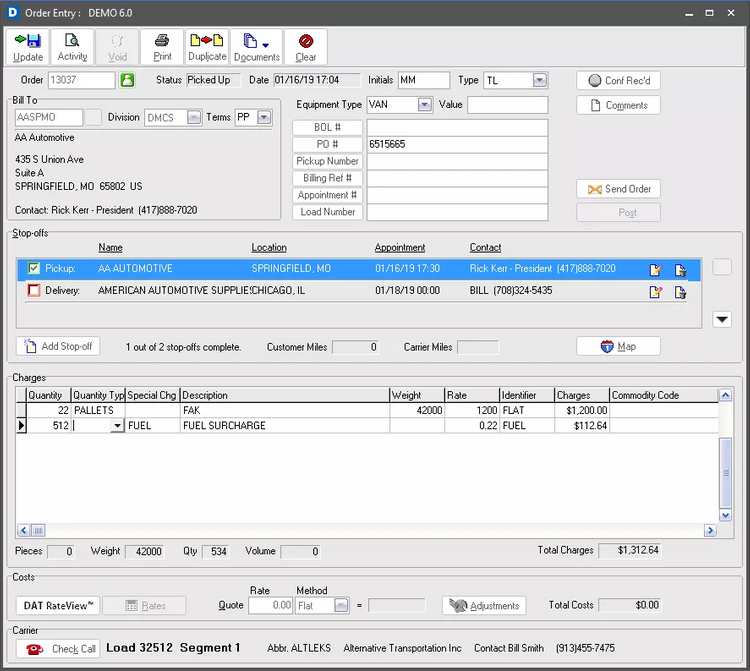
Freight Forwarding vs. Broker Software
While forwarders and brokers have interconnected roles, they have some key differences.
A freight broker is a liaison that helps connect a buyer and a seller. The things being bought and sold in transportation. A shipper of goods needs to work with a transportation carrier, and at many points, they’ll have different wants and needs. This is where a freight broker steps in. Their knowledge of contracts, freight laws, and paperwork ensures deals can be arranged and completed on time.
While a freight forwarder also acts as a medium between a carrier and a shipper, it provides a consolidation of freight services. Smaller shipments are combined into larger shipments that are more easily transportable. A freight forwarder also arranges storage on behalf of its clients.
In short, the biggest difference between a freight broker and a freight forwarder is:
- Possession of freight: Brokers do not handle storage of freight, while forwarders do.
- Legal obligations: Brokers have less legal responsibility as they are not physically possessing the freight.
Is QuickBooks a Freight Broker Software?
No, QuickBooks products are not inherently freight broker software. However, products such as QuickBooks Online can be used as freight broker software. This system will accommodate the bookkeeping needs of most freight brokers by providing estimating and invoicing tools that users can customize.
QuickBooks Pro and other product lines are known as industry-neutral accounting software, which plays a large part in the product’s popularity. Because it can be used for basically any industry, many freight brokers have successfully used QB to run their business and posted about their success online.
A major downside of using QuickBooks for your freight broker needs is that you will not receive any industry-specific applications such as load management or routing/dispatching. Many software companies provide these tools as add-ons to QB or allow you to integrate their stand-alone freight broker software with QuickBooks.




















































